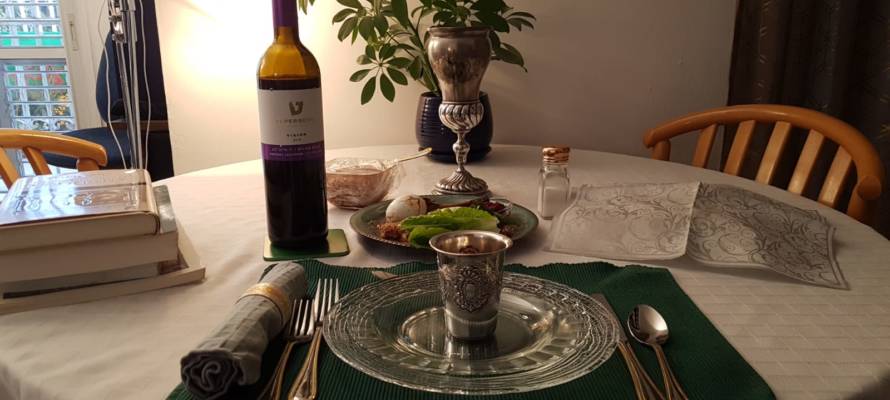When Israelis asked the traditional Passover seder question, “Why is this night different from all other nights?” many answered, “Because I am enjoying being alone.”
By Tsivya Fox-Dobuler
The holiday of Passover traditionally begins with family and friends gathering for a seder, a festive meal when all participate in reading the Haggadah, a book that tells the story of the ancient Israelites redemption from hundreds of years of slavery in Egypt to entering the Land of Israel as a free nation.
However, due to cornavirus restrictions forbidding people to gather, many found themselves in a situation they could never have imagined: they were alone for the seder.
Surprisingly, however, many said they managed to achieve the true essence of the holiday, bonding with God and the Nation of Israel.
“I approached this year’s seder recognizing the uniqueness of the situation due to coronavirus restrictions,” Moshe Myers, a fundraising consultant and musician who moved to Israel in 2002 from Canada, told United with Israel (UWI). “I approached the seder thinking that I’d be sitting with God and contemplating the miracles He did for the Jewish nation thousands of years ago until today. For that reason, I didn’t feel alone. I spent the time meditating on the moment, reading various commentaries on the Haggadah that enhanced my knowledge of the story, and felt inspired.”
Lisa Mechanick, a social media influencer who moved to Israel in 2007 from California and usually spends the seder night with family, contacted her neighbors to ask if they would like to observe the seder in their shared courtyard while maintaining six feet of social distancing, according to health regulations. The young couple and Mechanick each set their festive tables independently yet shared the reading of the Haggadah in both Hebrew and English.
“I received a “Seder-in-a-Box” along with flowers from a friend,” Mechanick told UWI. “I wanted to be with some others even while being alone. I feel like Israel is the safest place to be now. I can’t imagine being anywhere else.”
‘People Remember Others During These Trying Times’
Yehuda Meir Lipson, who moved to Israel in 2010 from New Jersey and specializes in technical support, usually spends the seder with friends. He felt very supported by his community in Israel even though he was alone.
“I felt very supported by those around me who delivered the unique holiday foods required for the seder as well as several days’ worth of meals,” Lipson told UWI.
“In Israel, even though I am alone, I feel part of this very special community,” he said. “It’s amazing to know that people remember others during these trying times.”
Artist Jacqueline Burnley, who moved to Israel in 2007 from England and normally spends the seder night with her family, said her experience brought healing from a childhood incident decades earlier.
“At the age of seven, my parents thought I was learning properly in Sunday school. However, when they asked me to say in Hebrew the section of the Haggadah traditionally read by children, I was not able to,” Burnley told UWI. “I felt embarrassed. However, now at 70 years old and living in Israel, I not only could read that section but I also got to lead a seder, a job usually done by men. I felt it was the closing of a circle.”
The Haggadah begins with the Ma Nishtana, asking four questions that are answered through the reading. Before the holiday began, politicians and social media platforms put out a call for Israel’s residents to go to their balconies and yards at 8:30 p.m. and publicly recite the Four Questions together as a show of unity, especially for those celebrating the holiday alone. People sang, danced, clapped and shouted, “Chag Sameach!” (Happy Holiday!)
‘I Didn’t Feel Alone’
“This was my first solo seder and I so enjoyed the preparations and the whole experience,” Aviva Adler, who moved to Beit Shemesh in 2011 from Maryland and is the librarian at Touro College in Israel, told UWI. “I felt connected to our Creator and to every Jew — past, present, and future — sitting at a seder, retelling the story of our people.
“When everyone went outside to chant the Ma Nishtana together, it was very beautiful. I went back inside to my solo seder, but I didn’t feel alone. I felt like one small part of a great unity.”
Dr. David Bienenfeld, who moved to Israel in 2017 and usually spends the seder with his daughter and family nearby, experienced both tears and laughter during his solo seder. “My daughter provided me with generous supplies of wonderful food,” he said. “More importantly, she and my grandchildren assembled a ‘personalized Haggadah‘ that was immensely creative, thoughtful and deeply meaningful. Though I have stacks of scholarly Haggadahs, I pored over this one for each step of the seder.”
Bienenfeld said he is using his time in isolation to come closer to God and make a deeper connection during his prayers three times a day. “I could magine myself in the feet of my parents in the labor camps, my grandparents in the pogroms, and our earlier ancestors trekking out of oppression in Egypt.”
He felt it particularly emotional when he reached the Four Questions. “I cried at not hearing my grandchildren ask the questions, as they do every year. But opening my window, I could hear our whole neighborhood singing the four questions at exactly the same time from their own windows and balconies. It fortified my sense of unity with the Nation of Israel, which I feel every day in Israel.”
